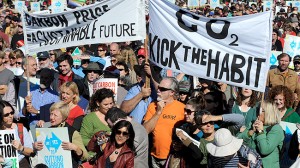New Poll Finds Overwhelming Support For A Carbon Tax Over Spending Cuts For Deficit Reduction
 A recent poll found Americans would prefer a carbon tax to cutting spending for deficit reduction by a huge margin.
A recent poll found Americans would prefer a carbon tax to cutting spending for deficit reduction by a huge margin.Commissioned by Friends of the Earth and conducted by the Mellman Group in December, the poll is the latest evidence that actions on climate change — and efforts to tax or cap carbon emissions specifically — are not the inevitable political losers assumed by beltway pundits. Another recent study by The Yale Project on Climate Change Communication determined that bipartisan majorities of voters felt action on global warming should be a priority, would consider a politicians’ views on the matter when voting, and support regulating carbon as a pollutant.
Among other things, the Friends of the Earth poll found that on the carbon tax:
•Voters overwhelmingly prefer it to cutting spending. When presented with two options for reducing the deficit — a carbon tax on “big polluters such as oil, gas, and other companies,” versus spending cuts for “programs like education, Social Security, Medicare and environmental protection” — 67 percent favored the carbon tax. 59 percent favored it “strongly.”
•Voters support it regardless of how it’s used. If revenue from the carbon tax is used to close the budget deficit, 70 percent favored a carbon tax, with 51 percent favoring it “strongly.” If revenue was to both shore up the budget and invest in clean energy jobs and programs to fight climate change, 72 percent favored the tax, with 54 percent in the “strongly” camp.
•Voters support it even after hearing the counter-arguments. After being presented with suggestions that “this is the wrong time to pass a new tax on every business and consumer in America,” that consumers will pay higher prices for gas and groceries, and that it might even fail to reduce emissions, over two-thirds of voters still favored the carbon tax — and once again, most who favored it did so “strongly.”
•Voters support it even when they’re Republican. Not surprisingly, 93 percent of Democrats favored a carbon tax. What was surprising was that 66 percent of Republicans did.
Another poll in December 2012, sponsored by the Oscar M. Ruebhausen Fund and conducted by YouGov, uncovered very similar numbers: When presented with various options for reducing $900 billion from the deficit by 2022, 56 percent favored a carbon tax that would bring in $159 billion in revenue over that time period — and favored it even with the knowledge it would raise the average cost of living by about $600 a year. The carbon tax option as favored over cutting Medicare benefits (34 percent) or cutting Social Security benefits (27 percent), and even favored over repealing ObamaCare (52 percent).
These results really shouldn’t be that surprising. While voters often support “cutting spending” or “shrinking government” in the abstract, multiple polls over the last few years have found that as soon as voters are asked about specific programs that meet concrete and particular needs, the enthusiasm for spending cuts vanishes entirely. Context matters enormously, and in the real world policies are always considered and passed in lieu of alternatives. So simply asking voters their opinion on a policy in a vacuum doesn’t provide a useful picture of their preferences. As Slate pointed out when discussing the YouGov poll, “People may hate the idea of a carbon tax in the abstract, but when faced with the alternatives for raising revenue, more than half of them support it.”
Meanwhile, the same shift is occurring internationally as well: In Britain, the number of voters there who see themselves as worse off under a carbon tax dropped in mid-2012 to a new low of 38 percent.
You can return to the main Market News page, or press the Back button on your browser.

